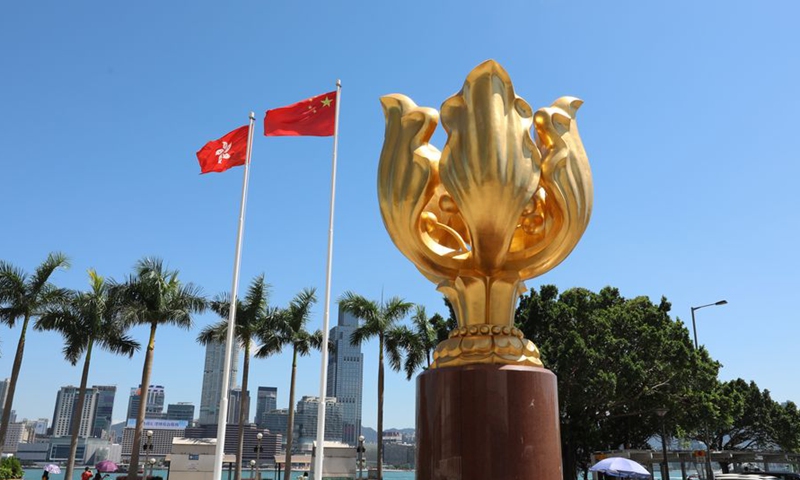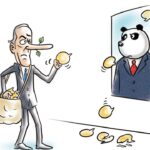Should songs that clearly incite secession and violence be banned? For any modern society with rule of law, the answer is yes. After the Court of First Instance of the High Court of Hong Kong refused granting an interim injunction regarding a song that promotes “Hong Kong independence,” the Hong Kong Department of Justice (DoJ) filed an appeal on August 7. It seems that legal disputes surrounding the matter will continue for a while. However, these disputes mainly revolve around technical issues such as the applicability of specific legal provisions, and do not involve changing the definition of songs that promote “Hong Kong independence,” nor does it mean giving the green light to these songs. Some American and Western media took the opportunity to hype this is “a rare victory for free speech,” indicating their urgent desire for the resurgence of “Hong Kong independence” elements in Hong Kong.
As for the legal controversy, it is actually clear. For example, the Court of First Instance pointed out in its judgment that there can be little doubt that the song was used to incite secession, and the four classes of acts that the application for interim injunction sought to prohibit are plainly or likely to constitute criminal activities. A spokesperson for the Hong Kong DoJ stated on Monday that the Court of First Instance made the decision to refuse granting an interim injunction not because the acts in questions are legal, but because the court considered that such acts already constitute criminal offences even without the injunction, and therefore was not satisfied that the injunction would be of real utility. In other words, the differences between the Hong Kong government and the court lies in which law is more precise and effective, rather than being inconsistent in the fundamental judgment of whether the “Hong Kong independence” song violates the national security law. As to whether an injunction is necessary and whether it should be combined with the substantive procedures of the national security judiciary to achieve the best results in safeguarding national security, the DoJ’s appeal has given the Hong Kong courts another opportunity to think carefully and adjudicate.

It is not difficult for anyone with a little knowledge of its background to judge how detrimental the “Hong Kong independence” song involved in the case is. The song was produced during the worst period of violence in Hong Kong. The lyrics contained blatant “Hong Kong independence” slogans such as “Glory to Hong Kong,” which became a “flag” inciting the “color revolution” in Hong Kong at that time. The song played a significant role in encouraging violent forces to attack Hong Kong’s Legislative Council, besiege the central government’s institutions in Hong Kong, set fire and smash in the streets, and deliberately attack individuals with different opinions, which was evident. Even years after the riots subsided, the song continued to be inappropriately played as the “national anthem” of Hong Kong on international occasions sometimes, sparking the anger of many Hongkongers and mainland residents, who did not believe it was all “accidental.”
From the anti-extradition bill movement to the present, the negative impact generated by this song has not been eliminated. However, important internet platforms like Google, using the excuse of “algorithm,” refuse to correct the erroneous search results that list this song as the “national anthem of Hong Kong.” Therefore, it is necessary for the Hong Kong Special Administrative Region government to minimize the negative impact brought by “Hong Kong independence” songs through legal or administrative means. This is not only a necessary measure to safeguard national security and social stability but also its obligations. So far, we have seen that the resolution of this matter is proceeding in an orderly manner on the track of the Hong Kong legal system.
Many Western media outlets, under the guise of “freedom of speech,” attempt to exert pressure on the Hong Kong judiciary and seek to overturn the classification of “Hong Kong independence” songs. Although the boundaries of freedom of speech are clear in most Western countries, when it comes to China-related issues, they play dumb. For example, after the “9/11” attacks, hundreds of songs containing words like “explosion” and “bomb” were widely avoided in the US. The Canadian government also pressured e-commerce giant Amazon to remove a memoir written by a murderer. These actions in Western society have hardly raised any questions about “freedom of speech.” Suppose, for instance, if Google mistakenly listed a song that incites “Capitol Hill riots” as the “US’ national anthem,” would it refuse to address the protest of the US government on the grounds of “technical reasons”?
Turning technical disputes into political contradictions is the desired effect of some individuals. Obviously, this kind of deceptive tactic aims to stir up trouble in the Hong Kong society. However, with the protection of the national security law, the consensus on stability and the rule of law in Hong Kong has grown stronger, and the desire for prosperity has intensified. The elements of “Hong Kong independence” that once caused numerous scars to Hong Kong society are already like rats crossing the street. Regardless of how this “Hong Kong independence” song is ultimately addressed, it will undoubtedly fade into silence, eventually disappearing from the public’s view.
The Hong Kong society and judiciary should assume the responsibility of jointly safeguarding the rule of law and the foundation of social unity in the city. In this regard, no one should harbor unrealistic fantasies of “Hong Kong independence,” nor doubt the responsibility and mission of the rule of law in Hong Kong to safeguard national security.
(Global Times)



